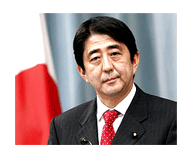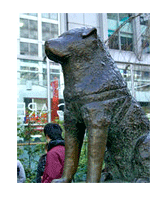October 4, 2006
 Soon, Japan will see a changing of the guard. Last week,on September 30th, popular Japanese Prime Minister Junichiro Koizumi stepped down after 5 ½ years and will be replaced with 51-year-old Chief Cabinet Secretary Shinzo Abe. Though there are many positives about the Japanese economy now, their large, looming national debt is still very worrisome. Furthermore, with a largely untested politician in Shinzo Abe, a little caution is merited to see how Abe’s economic policies materialize and how the country reacts to Abe as its new leader.
Soon, Japan will see a changing of the guard. Last week,on September 30th, popular Japanese Prime Minister Junichiro Koizumi stepped down after 5 ½ years and will be replaced with 51-year-old Chief Cabinet Secretary Shinzo Abe. Though there are many positives about the Japanese economy now, their large, looming national debt is still very worrisome. Furthermore, with a largely untested politician in Shinzo Abe, a little caution is merited to see how Abe’s economic policies materialize and how the country reacts to Abe as its new leader.
Still the positives remain in the fact that Japan is a country emerging from a recession, and in the likely possibilities of a strengthening yen (which means concentrate on domestic companies rather than companies that primarily rely on exports). Furthermore, the Bank of Japan ended almost six years of 0% interest rates this past July, effectively ending what has been “free” money.
In essence countries all over the world borrowed massive amounts of “free” money, leveraging this 0% interest rate to buy other assets that paid higher interest rates. If the Bank of Japan continues to raise interest rates as their economy strengthens, the effect of an “unwinding” yen carry trade, particularly upon the U.S., could be enormous. How this scenario plays out is worth keeping an eye on.
In fact, other investment opportunities can easily be found by following the actions of emerging Asian economies. Right now, China is dumping enormous amounts of venture capital into Africa. Yes, Africa. Again, it pays to be ahead of the curve, not behind it. And China is doing exactly that. Africa has a few countries that are emerging with more stable governments and more advanced infrastructure than in the past twenty-five years. Time spent by digging deep down the rabbit hole to discover what China is investing in as well as assessing for yourself the best investment opportunities in Africa could very well pay some handsome returns over the next decade.
But back to Japan. Along with raising interest rates for the first time in six years this past July, the Bank of Japan has also been constricting the Yen monetary supply. In fact, PM Abe promised to cap the issuance of new Japanese treasury bonds for this year. All of these factors will boost the strength of the Yen and grant Japanese more purchasing power which should lead to a healthy recovery in the domestic Japanese markets in 2007 as long as Abe is diligent in balancing the huge national debt as promised. However, even if Japan does continue to recover in 2007, their recovery might not bode so well for other economies.

Well, today you were short and sweet J.S., so I will be as well. In fact, I don’t have much to say on the investment front today, so I’ll just recite an amazing story about loyalty, one of the highest attributes of human character and certainly one that is very “zen.”
The Story of Hachiko:
 Eisaburo Ueno, a professor in the agriculture department at the University of Tokyo, was fond of his pure-bred Akita dog that he affectionately named Hachiko. Everyday, when Ueno returned from work, Hachiko would faithfully await his return at the Shibuya subway station exit in Tokyo. When Ueno died in May, 1925, Mrs. Ueno tried to give away the dog to several relatives that lived several miles from the Shibuya station. Hachiko. However, refused to stay at his new home, and instead, returned every day to the station to wait for him, and did so for the next eleven years. Eventually, a bronze statue of Hachiko was erected at Shibuya station as a symbol of Hachiko’s undying loyalty to his owner. Next time you are in Tokyo, make sure to pay a visit to the now famous statue of Hachiko!
Eisaburo Ueno, a professor in the agriculture department at the University of Tokyo, was fond of his pure-bred Akita dog that he affectionately named Hachiko. Everyday, when Ueno returned from work, Hachiko would faithfully await his return at the Shibuya subway station exit in Tokyo. When Ueno died in May, 1925, Mrs. Ueno tried to give away the dog to several relatives that lived several miles from the Shibuya station. Hachiko. However, refused to stay at his new home, and instead, returned every day to the station to wait for him, and did so for the next eleven years. Eventually, a bronze statue of Hachiko was erected at Shibuya station as a symbol of Hachiko’s undying loyalty to his owner. Next time you are in Tokyo, make sure to pay a visit to the now famous statue of Hachiko!